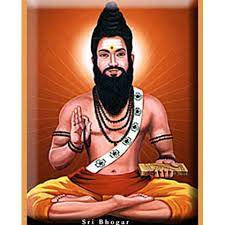Siddhas Born & lived in Chidambaram
Glory of Chidambaram
Chitambalam is where Devas reside
Chidambaram is where Devas reside
Thiru Ambalam is where Devas reside
The Sabha of the South is where Devas reside. (886)
தேவர் உறைகின்ற சிற்றம் பலம்என்றும்
தேவர் உறைகின்ற சிதம்பரம் என்றும்
தேவர் உறைகின்ற திருவம் பலம்என்றும்
தேவர் உறைகின்ற தென்பொது ஆமே .
Glory of Chidambaram
The Human Form is unto Siva Lingam
The Human Form is unto Chidambaram
The Human Form is unto Sadasivam
The Human Form is unto the Holy Dance, forsooth.
மானுடர் ஆக்கை வடிவு சிவலிங்கம்
மானுடர் ஆக்கை வடிவு சிதம்பரம்
மானுடர் ஆக்கை வடிவு சதாசிவம்
மானுடர் ஆக்கை வடிவு திருக் கூத்தே திருமந்திரம் (1709)
Miracles and Mysticism
Chidambaram has a history of miracles, both inner and outer, and is associated with great sages like Sage Vyaghrapada and Sage Patanjali.
It is believed that these sages still reside in the inner realms of Chidambaram.
Chidambaram and the Thillai Nataraja Kovil hold a profound metaphysical and spiritual significance, bridging the realms of science and spirituality while offering seekers a path to inner realization and transformation.
Sri Dhanvantari Siddhar

Siddhar Dhanvantari is a revered figure in the history of Tamil Siddha Medicine System and is often referred to as the “Father of Ayurvedic Medicine System.” His significance extends to both Ayurveda and Siddha medicine, and he is recognized as a divine healer in Indian mythology. Here are some key aspects of Siddhar Dhanvantari’s role and importance:
Heavenly Doctor: In Hindu mythology, Dhanvantari is considered the physician of the gods and is associated with the churning of the ocean (Samudra Manthan). According to the Puranas, he emerged during this churning holding a pot of amrita, the nectar of immortality, in one hand and medicinal herbs in the other.
Incarnation of Lord Vishnu: Dhanvantari is regarded as an incarnation of Lord Vishnu, one of the principal deities in Hinduism. As Lord Vishnu, he is depicted with four hands, symbolizing his divine attributes. One of his hands holds medicinal herbs, signifying his role as a healer.
Healing and Longevity: Dhanvantari is believed to possess the power to swiftly cure illnesses and grant longevity to living beings. His divine grace and knowledge of medicinal herbs are associated with the well-being and health of all creatures.
Initiator of Medical Science: Dhanvantari is credited with initiating the field of medical science and bestowing knowledge of medicine upon the world. He is considered the source of Ayurveda, an ancient system of medicine that emphasizes holistic well-being and natural healing.
Jeeva Samadhi: Siddhar Dhanvantari’s jeeva samadhi (a state of deep meditation and spiritual realization) is said to be located in Vaitheeswaran Koil in Chidambaram, Tamil Nadu. This place is considered sacred by those seeking healing and well-being.
Continued Reverence: Even today, Dhanvantari is highly revered by practitioners of Ayurveda, Siddha medicine, and those seeking traditional forms of healing in India. His blessings are sought for health, wellness, and the successful practice of medicine.
Siddhar Dhanvantari’s legacy continues to inspire and guide those in the field of medicine and traditional healing systems. His association with Lord Vishnu and the divine knowledge he imparted in the form of Ayurveda has made him a prominent figure in the realm of healthcare and spirituality.
Birthplace of Sri Nathamuni

Sri Nathamuni, a revered saint and pioneer of the devotional movement of Yoga, was born in the village of Viranarayana, which is located near Chidambaram. In modern times, Viranarayana is often identified as Kattumannarkoil. Sri Nathamuni made significant contributions to religious philosophy and is known for his profound knowledge of both Yoga and devotional practices.
One of Sri Nathamuni’s notable works is the treatise called “Yoga-rahasya,” which translates to “Secrets of Yoga.” This text holds a special place in the history of Yoga philosophy. However, there is an aura of mystery surrounding this text. It is believed that Sri Nathamuni received the teachings contained in the Yoga-rahasya while in a deep meditative trance.
What adds to the mystery is the belief that Sri Nathamuni received these teachings from Sri Nammalvar, a revered poet-saint who lived many centuries earlier. This transmission of knowledge across generations and the claim of receiving it in a meditative state contribute to the mystique of the Yoga-rahasya.
Additionally, it is said that the Yoga-rahasya was lost under mysterious circumstances and was thought to be gone forever. This disappearance and subsequent rediscovery of ancient texts are common themes in the history of spiritual and philosophical literature.
Sri Nathamuni’s life and contributions continue to inspire those interested in the intersection of Yoga, devotional practices, and ancient wisdom. His teachings and the Yoga-rahasya remain important elements of the spiritual heritage of India.
Birthplace of Mahavatar Babaji

Mahavatar Babaji is a revered and enigmatic figure in the realm of yoga and spirituality. While there is a certain mystique surrounding his origins and life, some details have been shared by those who claim to have encountered him or received teachings from him. One of the pieces of information that has emerged is regarding the birthplace of Mahavatar Babaji.
According to the accounts of those who have had experiences with him, Mahavatar Babaji was said to have been born in Swethanathapuram, an ancient seaport near Chidambaram, India. This birthplace is said to have historical significance and is located in what is now known as Parangipettai. The birthdate attributed to Mahavatar Babaji is November 30, 203 A.D.
It’s important to note that the details of Mahavatar Babaji’s life and existence are not universally accepted, and his story is often intertwined with legend and mysticism. He is regarded as a highly advanced yogi and spiritual teacher who is said to have achieved spiritual immortality and continues to guide and inspire seekers on their spiritual journeys.
Mahavatar Babaji’s teachings and influence have resonated with many individuals worldwide, particularly among mystics, yogis, and those on a spiritual path. His emphasis on the interconnectedness of all beings and the idea of a shared intelligence reflects a profound spiritual philosophy that has touched the lives of many.
